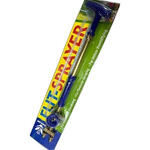Filter By OPTIONS
- 250ml $14.95
- 500ml $20.95
- 400g
-
Filter By Stock
- In Stock (4)
Bronze Orange Bug
Bronze Orange Bugs change colour as they grow. Young green nymphs hatch from eggs then turn orange/pink as they grow before eventually becoming black when fully grown. By this stage they are about 25mm long.
Plants Attacked
All citrus plants including a range of native citrus
Organic Control Method for Bronze Orange Bugs
Most people only think about this pest when they notice the large orange and black bugs in late spring and summer. At this size they are difficult to control organically but here are your options:
Physical Removal
On smaller trees it is possible to catch and kill the bugs as they don’t move quickly. Use tongs to knock them into a bug of soapy water where they’ll drown. Be sure you wear a long sleeved top and gloves to protect your skin against the caustic liquid they squirt. Protect your eyes as well with sunglasses. Some people use a vacuum cleaner to suck them up instead but make sure it’s an old vacuum. You’ll never get the stink out of it!
On hot days bronze orange bugs will withdraw from the foliage and will congregate on the lower trunk of the tree where it is cooler. This is the perfect opportunity to squash them with a stick or collect them via the above methods.
Sprays
Pyrethrum sprays will kill these bugs but there are two things to be mindful of here. Firstly pyrethrum is non-selective. It will kill pretty much any insect it touches including all the good insects like bees and ladybeetles. Secondly virtually all the pyrethrum products for sale to home gardeners are not allowed in organic farming. This is because they usually contain another ingredient called piperonyl butoxide which is banned. We know that you will regularly read that pyrethrum is an organic spray but unfortunately this is not true if piperonyl butoxide is in the product. Read the label as it is required to be declared as an Active Constituent.
Gardeners who spray Eco-Oil during winter and early spring (to control other pests like scale) have reported a significant drop in bronze orange bug numbers later in the season. We have not run any trials ourselves but we suspect Eco-Oil is destroying eggs and smothering the very young nymphs at the same time as the scale. If however you spray later in the year when you start seeing/smelling the larger stink bugs we know that the oil is unable to kill them because they’re too large.
Other gardeners have reported good results when spraying their ornamental citrus with Eco-Neem for other pests. Eco-Neem controls insects in many different ways and one is via repellency.

DIATOMACEOUS EARTH
Diatomaceous Earth is a silica rich powdered mineral and is 100% natural and non-toxic. It is made from the fossilised remains of freshwater single-c
From $8.95

DIATOMACEOUS EARTH - POWDER DISPENSER
Heavy duty dispenser used to spray Diatomaceous Earth. Is best used for smaller projects requiring a fine spray. For large jobs, use the DIATOM
$8.95

DIATOMACEOUS EARTH - SHAKER
Heavy duty stainless steel shaker used to sprinkle Diatomaceous Earth. Is best used for small to medium proje
$10.95

FLIT SPRAYER
Simply attach the tube to a regular water bottle, fill your container, and then screw on to your sprayer and you’re ready to go. Has a highly flexi
$17.95


